The tech industry continues to experience an increasing demand for skilled software developers. Junior frontend developers play a vital role in creating functional, visually appealing web applications. Despite having less experience, they offer a fresh perspective, a strong eagerness to learn, and the ability to focus on specific tasks that allow senior developers to concentrate on more complex projects.
At Aloa, we recognize the growing need for skilled developers and connect our clients with highly vetted teams of experts. Our software developers specialize in crafting functional, visually appealing web applications that elevate user experience. We prioritize clear project roadmaps and high-quality results, ensuring your software projects meet industry standards.
Leveraging our extensive experience, we’ve created this guide to help you hire the right junior frontend developer for your team. We explore their responsibilities, essential skills, differences from senior roles, and the benefits they bring to your business. By the end of this blog, you’ll be able to hire a junior frontend developer with the technical skills needed to succeed in your team.
Let's get started!
Who Is A Junior Frontend Developer?
A junior frontend developer is an entry-level web developer responsible for building and maintaining web applications' user-facing components. They use HTML, CSS, and JavaScript to create responsive, functional designs, working with a team to enhance the user experience.
What Does A Junior Frontend Developer Do?
A junior frontend developer plays a vital role in shaping the user experience of websites and web applications. They report directly to a senior developer and focus on handling specific tasks that can help save the senior developer's time. As part of their core responsibilities, they work closely with the senior developers and design teams to implement visually appealing and functional interfaces. This allows the senior developers to focus on more complex tasks while ensuring the overall quality and cohesion of the project.
Here are the core duties of a junior frontend developer include:
- Writing Clean Code: Develop and maintain efficient, well-structured code using HTML, CSS, and JavaScript.
- Testing Website Functionality: Ensure webpages work seamlessly across devices and browsers.
- Debugging Issues: Identify and fix bugs in the frontend code to maintain usability.
- Collaborating with Teams: Work closely with designers and backend developers to implement features.
- Learning New Technologies: Continuously improve skills to adapt to changing trends.
A junior frontend developer contributes significantly to a project’s success. The senior developer provides guidance and support, ensuring the tasks align with the project’s needs and the junior developer’s current understanding of the codebase. Regular reviews and feedback from the senior developer ensure that the work is on track and that the junior developer continues to grow and learn through hands-on experience.
Key Differences Between Junior and Senior Developers
Junior and senior developers play distinct roles in software development. They differ in experience, responsibilities, and decision-making authority. Understanding their differences helps your business assign tasks effectively and foster growth.
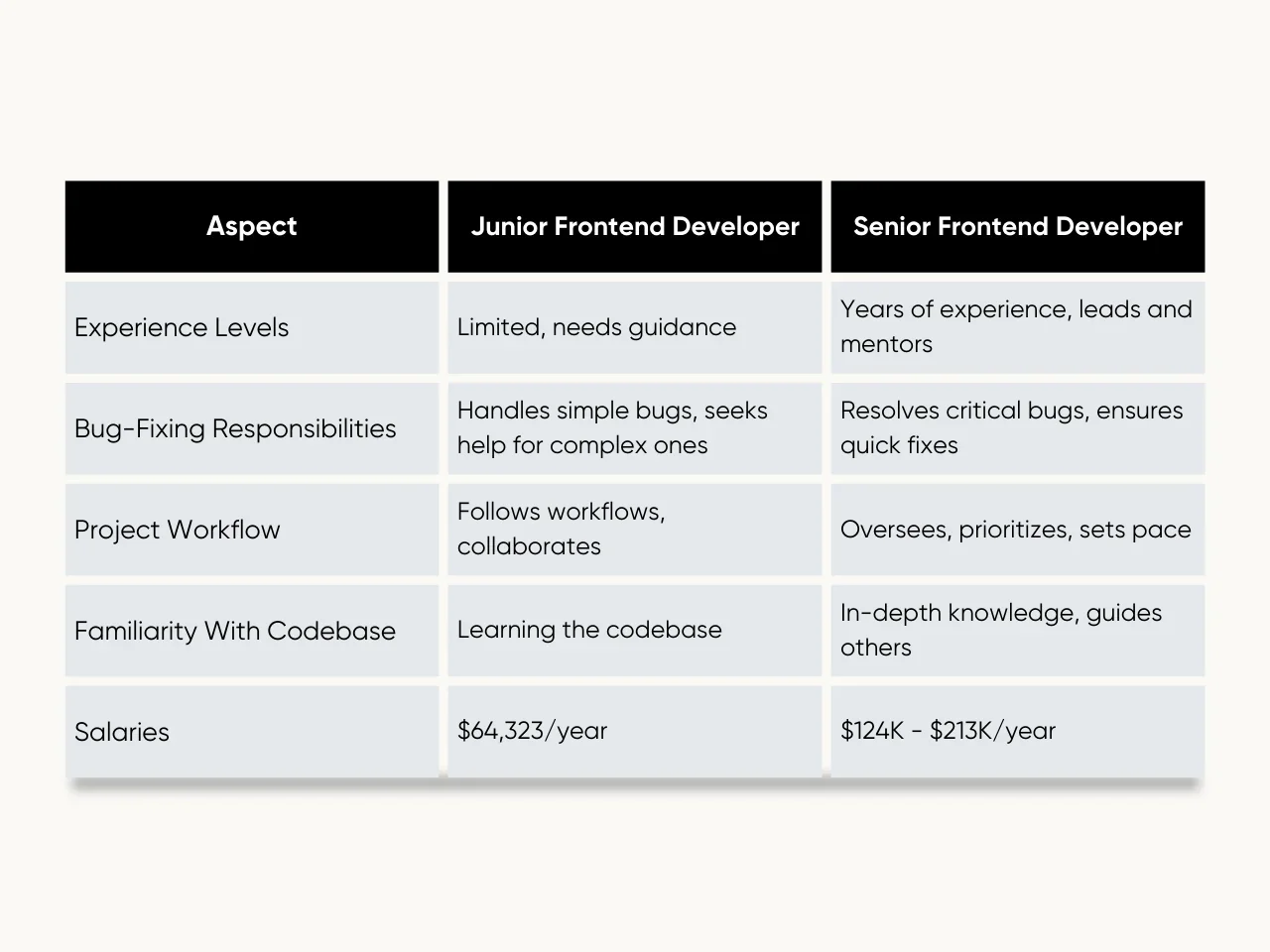
1. Experience Levels
Junior frontend developers usually begin their careers with limited experience, typically having 0-2 years of hands-on work. They often rely on guidance to navigate complex projects and learn best practices. In contrast, senior developers usually have 5+ years of experience. Their extensive background enables them to lead projects, mentor juniors, and make critical decisions confidently.
2. Bug-Fixing Responsibilities
A junior frontend developer typically handles straightforward bugs. They write the code to address the issues, ensuring it aligns with the project's standards. Once the task is completed, the senior developer reviews the code, provides feedback, and closes the pull request (PR) after verifying the solution. This process helps the junior developer build a stronger understanding of the codebase while allowing the senior developer to ensure quality and consistency in the work.
3. Salaries
A junior frontend developer in the United States earns an average salary of $64,323. In contrast, senior front-end engineers average $124K - $213K. Salary levels reflect developers' expertise and contributions.
Responsibilities and Skills of A Junior Frontend Developer
A junior frontend developer plays an essential role in creating user-friendly web interfaces. Their responsibilities and skills form the foundation of high-quality, responsive, and engaging websites. Below, we explore their key responsibilities and skills.
Responsibilities
A junior frontend developer takes on various tasks to ensure smooth web functionality. These responsibilities include:
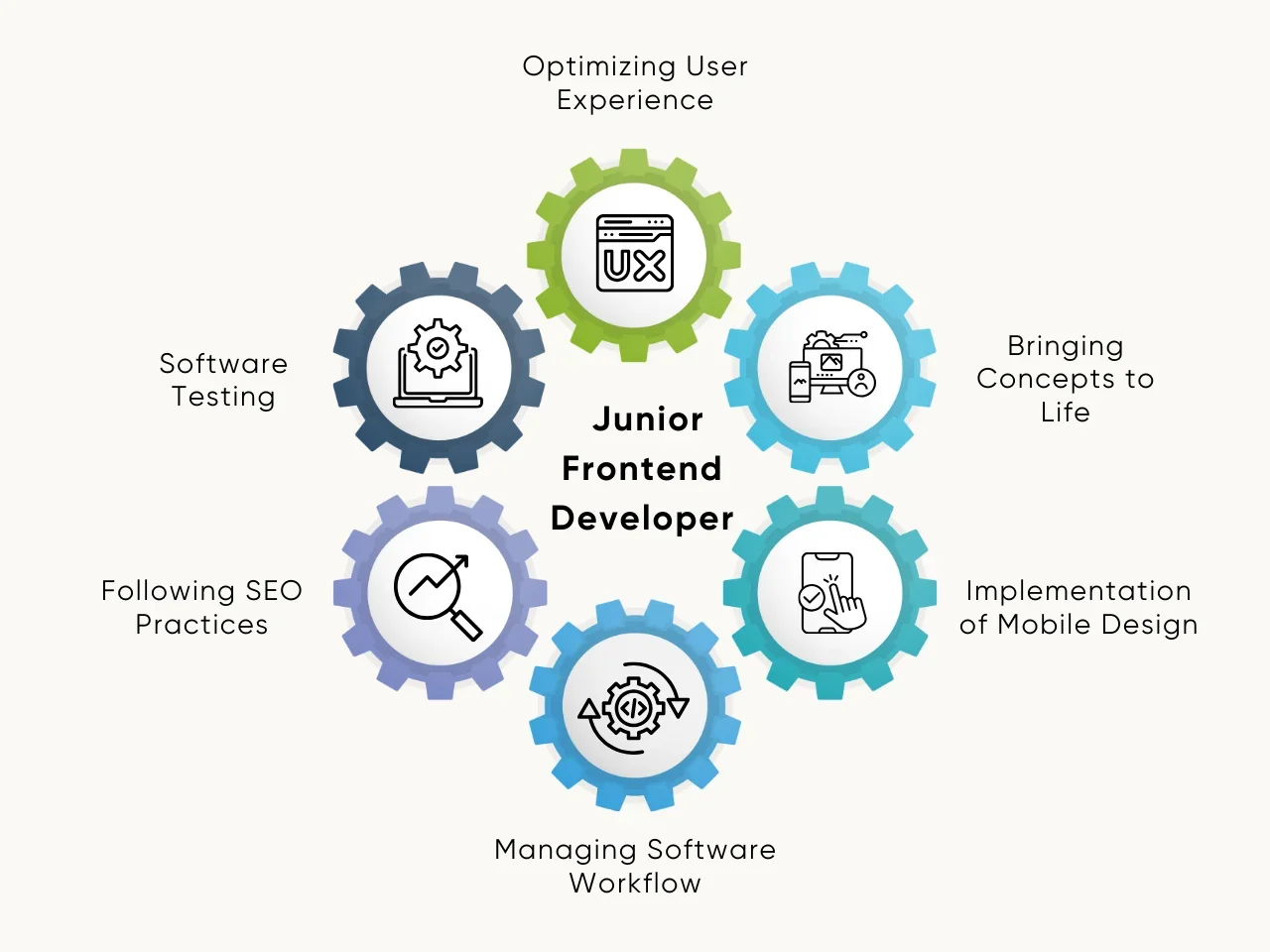
- Optimizing User Experience: Enhance usability by reducing load times and improving page responsiveness.
- Bringing Concepts to Life: Convert visual mockups into functional, interactive web pages.
- Implementation of Mobile Design Adapt websites for mobile devices ensures responsiveness. Junior developers create layouts that work seamlessly across different screen sizes and resolutions.
- Managing Software Workflow Organize and maintain clean, structured code allows collaboration.
- Following SEO Practices: Integrate SEO principles, such as optimizing meta tags and content structure to help improve website rankings and visibility.
- Software Testing: Identify and fix bugs to ensure a functional and error-free user experience and help deliver reliable and efficient web solutions.
Skills
A junior frontend developer requires diverse technical and soft skills to succeed. These include:
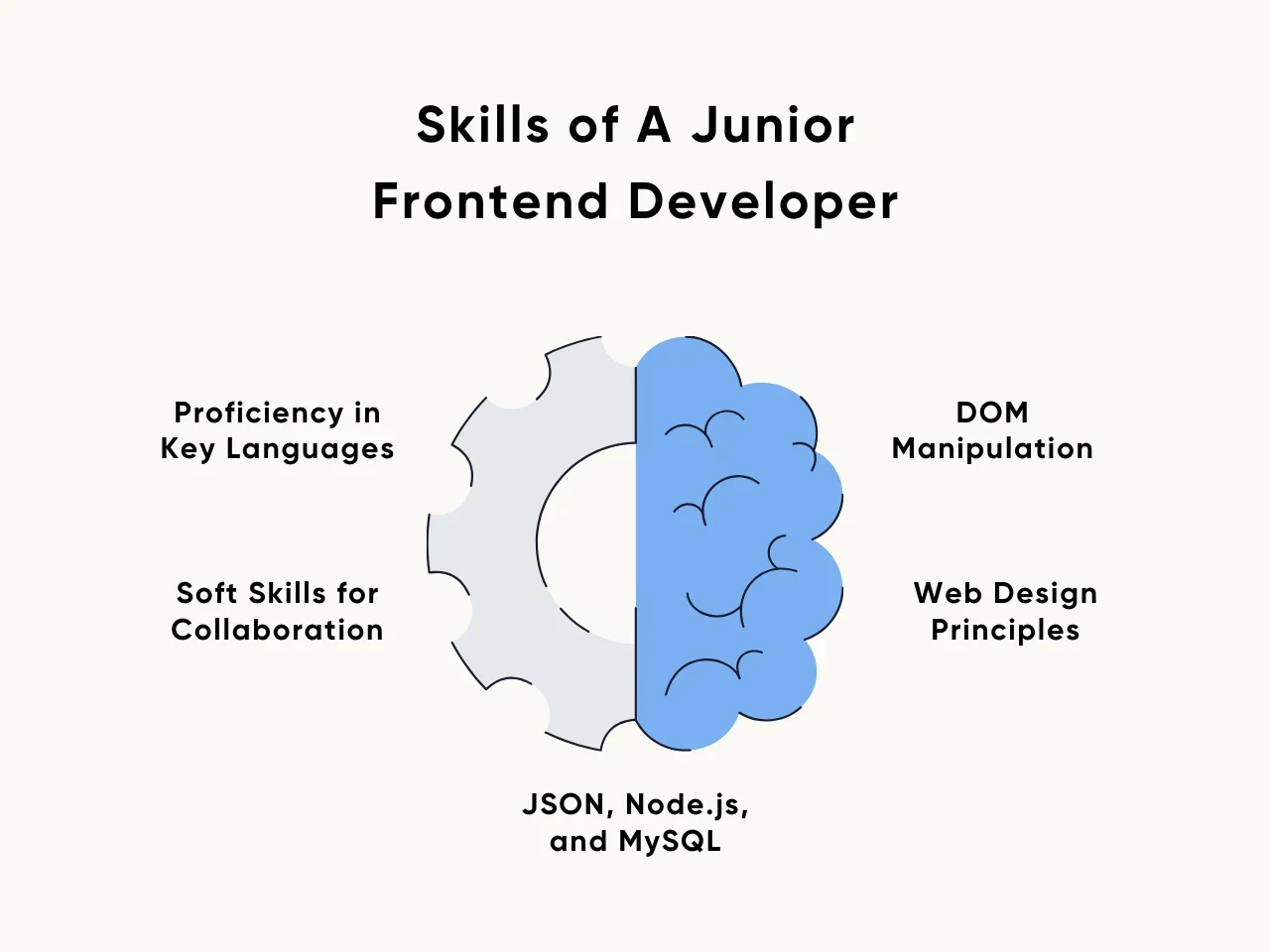
- Proficiency in Key Languages: Knowledge of HTML, CSS, and JavaScript forms the backbone of web development. It allows structure style and brings interactivity to websites.
- DOM Manipulation: The Document Object Model (DOM) lets junior developers dynamically interact with and update content.
- Web Design Principles: A strong grasp of layout, typography, and color theory ensures visually appealing designs that align functionality with aesthetics.
- JSON, Node.js, and MySQL: Familiarity with these technologies enhances backend integration to handle data storage, server communication, and dynamic content.
- Soft Skills for Collaboration: Effective communication, teamwork, and adaptability are essential in collaborative environments.
Why Hiring a Junior Frontend Developer Can Benefit Your Company
Junior developers are usually eager to learn and can be a great addition to your team. Here are some key ways junior developers contribute to your company's success and the broader tech industry:
1. Junior Developers Can Help Lessen Loads
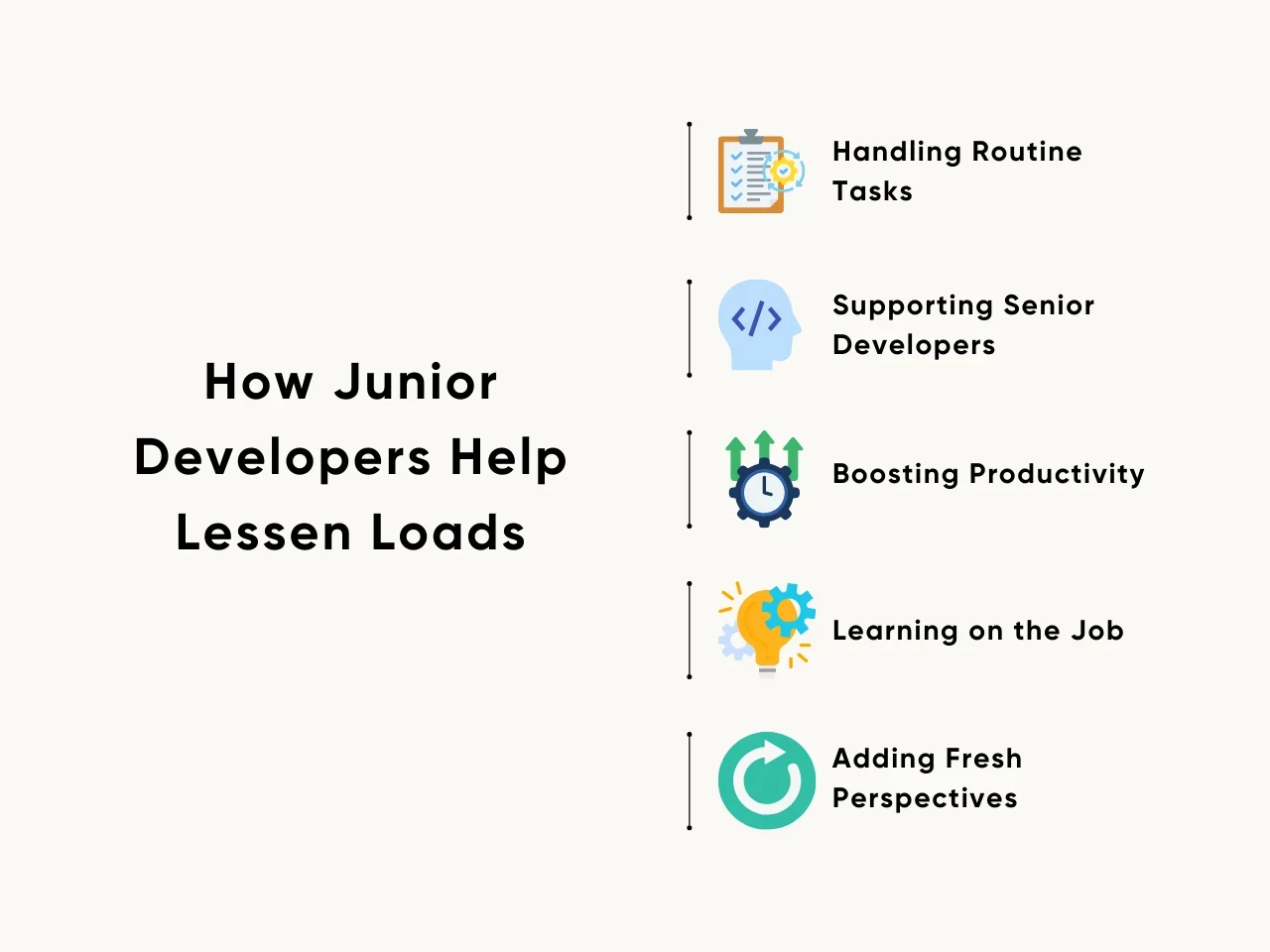
Junior developers can help lighten the workload by handling routine tasks, allowing senior team members to focus on more strategic initiatives. As a business owner, you rely on junior developers to help balance workloads across your team. Junior developers can manage essential updates and fixes, allowing senior team members to focus on strategic challenges.
Hiring junior developers helps distribute workloads, fosters team growth, and introduces fresh perspectives. By managing simpler tasks and continuously learning, these developers boost productivity and contribute to a more efficient, innovative development process.
2. Junior Developers Are Senior Developers In-Waiting
A junior frontend developer creates a strong foundation for future growth within your company. Their adaptability and growth potential make them valuable contributors to long-term success. Here are the factors that make junior developers excellent senior developers in the future:
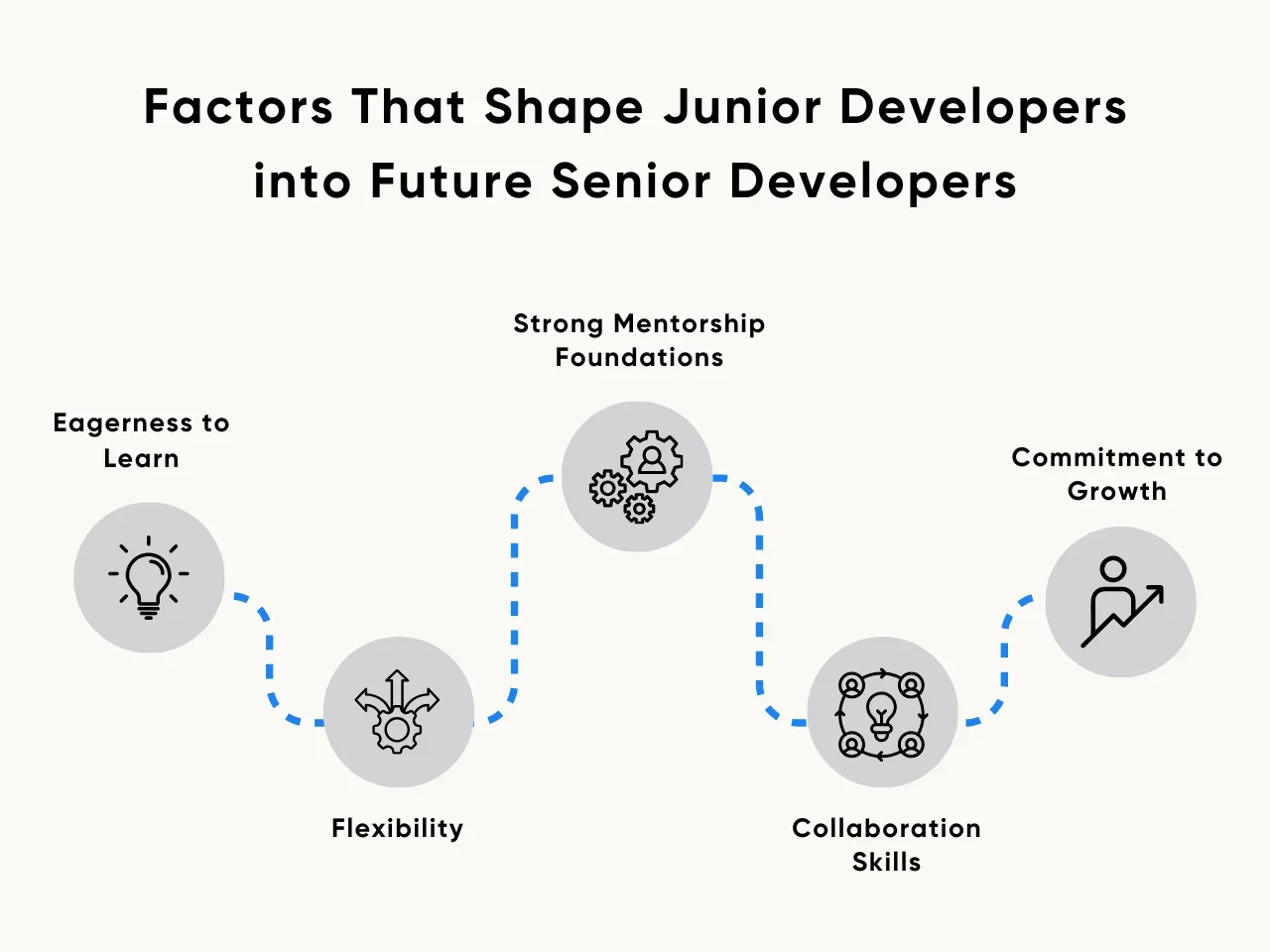
- Eagerness to Learn: Junior developers actively seek knowledge and stay updated with the latest tools and trends.
- Flexibility: They adapt to new challenges and methodologies with ease.
- Strong Mentorship Foundations: Juniors absorb guidance effectively, building critical skills.
- Collaboration Skills: Working with teams helps refine their communication and teamwork abilities.
- Commitment to Growth: They are motivated to advance within an organization.
3. The Broader Impact on the Tech Industry
Junior developers play a key role in shaping the tech industry. They bring energy to the talent pool and are always excited about new challenges and opportunities. Here is how junior developers are making an impact everyday:

- Increased Talent Pool: Welcoming juniors addresses the growing demand for skilled professionals.
- Fostering Innovation: Their adaptability to new tools encourages experimentation and novel ideas.
- Enhancing Diversity: Juniors often represent underrepresented groups, promoting inclusivity in tech teams.
- Building Industry Foundations: Providing mentorship opportunities ensures knowledge transfer and solidifies best practices.
Key Takeaway
A great junior frontend developer can handle essential tasks, adapt to new workflows, and grow into leadership positions within your business. Think of them as a longer-term investment–they can become an invaluable part of your team given the right set of hard and soft skills.
Hiring junior developers can be a cost-effective strategy for building a well-balanced team. Over time, these developers can demonstrate great loyalty and show a deep understanding of your company’s unique challenges and solutions.
Are you ready to hire a junior frontend developer? At Aloa, we can connect you with top-tier development teams that are comprised of both junior and senior talent. We offer hands-on, ROI-focused frontend development services tailored to your specific needs. We provide the best frontend development services tailored to your vision. Let’s build something extraordinary together!

